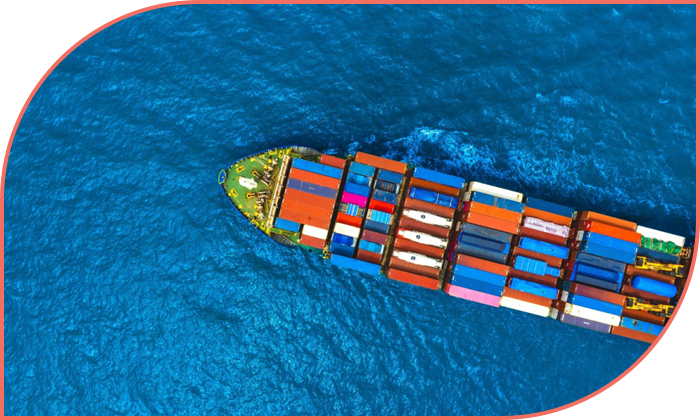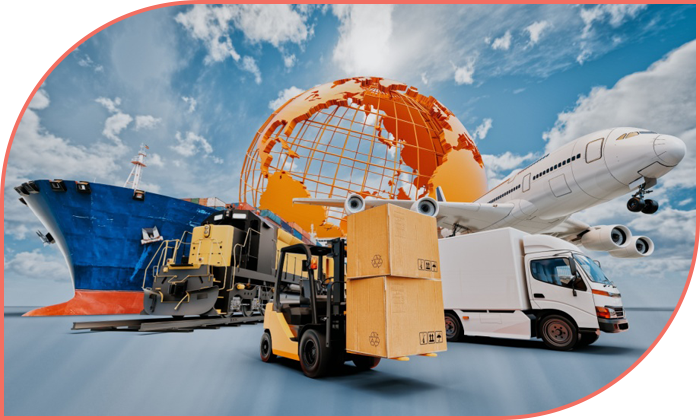Free On Board (FOB)
What is the definition of the Free On Board Incoterm?
The FOB Incoterm (Free On Board) defines the point at which the seller's responsibilities transfer to the buyer during shipping.
Under FOB shipping, the seller is responsible for delivering the goods to a named port, loading them onto the vessel designated by the buyer, and clearing the goods for export.
Once the goods are on board the vessel, the risk and cost transfer to the buyer. The buyer must then handle transportation to the final destination (including import formalities and duties).
It’s important to note that FOB is specifically designed for sea and inland waterway transport. It’s not suitable for container shipments, where a different term, such as Free Carrier (FCA), would be more appropriate.
What are the FOB responsibilities for a buyer?
Buyers shipping under FOB terms take on multiple risks and costs once the goods are loaded onto the vessel:
- Payment for the goods
- Contracting and paying for the main carriage, including ocean freight
- Bearing all risks of loss or damage to the goods from the moment they are loaded onto the vessel
- Handling destination charges and customs clearance fees at the destination port
- Managing any further inland transportation to the final destination.
- Ensuring import clearance, including all related duties and taxes
What are the FOB responsibilities for a seller?
While the seller bears responsibility for the main leg of the journey, the seller also has several responsibilities, per the free on board incoterm:
- Ensuring the goods are packed and ready for transport
- Arranging and paying for transport to the port of shipment.
- Handling all export documentation and necessary customs clearance at the port of origin
- Paying for loading the goods onto the vessel
Providing the buyer with proof of delivery (e.g., the - Bill of Lading)
- Bearing all risks and costs associated with the goods until they are safely on board the vessel
Compare Freight Shipping Rates in Seconds
Get instant quotes from leading ocean and air freight providers. Find the best rates for your shipping needs in one place.
When is a Free On Board agreement used?
FOB shipping is used in specific scenarios within international trade, particularly involving sea or inland waterway transport.
The FOB incoterm, meaning the transfer of goods via ocean freight, can be particularly beneficial for bulk cargo.
It’s also suitable for transactions where the buyer prefers to control the main carriage and choose their own freight forwarder (potentially to secure reduced shipping costs).
The FOB incoterm, meaning the transfer of goods via ocean freight, can be particularly beneficial for bulk cargo.
It’s also suitable for transactions where the buyer prefers to control the main carriage and choose their own freight forwarder (potentially to secure reduced shipping costs).

What are the benefits of Free On Board terms?

FOB shipping is the preferred method for many buyers and sellers because it gives each party a significant degree of control.
Buyers can select their preferred freight forwarder and negotiate the best possible shipping rates. The flexibility of the free on board incoterm means transport costs are transparent, and there are no hidden fees (potentially lowering overall shipping expenses).
For sellers, FOB terms mean they are only responsible for transporting goods to the port of shipment and loading them onto the vessel. These duties can serve to leverage the seller’s local knowledge and understanding of export procedures.
As the seller completes this part of the shipping process, it can potentially reduce the delays that could arise if the buyer were to manage these aspects remotely.
The FOB incoterm clearly defines the point at which responsibility transfers from seller to buyer.
Once the goods are loaded onto the shipping vessel, the buyer assumes all risks and costs. FOB’s clear delineation helps both parties by reducing the likelihood of disputes.
Cost control
Buyers can select their preferred freight forwarder and negotiate the best possible shipping rates. The flexibility of the free on board incoterm means transport costs are transparent, and there are no hidden fees (potentially lowering overall shipping expenses).
Local expertise
For sellers, FOB terms mean they are only responsible for transporting goods to the port of shipment and loading them onto the vessel. These duties can serve to leverage the seller’s local knowledge and understanding of export procedures.
As the seller completes this part of the shipping process, it can potentially reduce the delays that could arise if the buyer were to manage these aspects remotely.
Clear risk transfer
The FOB incoterm clearly defines the point at which responsibility transfers from seller to buyer.
Once the goods are loaded onto the shipping vessel, the buyer assumes all risks and costs. FOB’s clear delineation helps both parties by reducing the likelihood of disputes.
Get The Best Freight Rates Today
Easily compare rates from top ocean and air freight carriers. Save time and money on your next shipment.
What are the drawbacks of Free On Board terms?
High buyer liability
FOB shipping places significant liabilities on the buyer.
As soon as the goods are on board, the buyer assumes all risks, including potential damage or loss during transit. Shipping can be particularly costly if unforeseen issues arise during shipping.
Higher upfront costs for the buyer
FOB terms often require the buyer to incur higher upfront costs.
While the seller handles the costs associated with transporting the goods to the port and loading them onto the vessel, the buyer is responsible for the main carriage, insurance, unloading at the destination port, and any further inland transportation.
As a result, free on board shipping can lead to significant initial expenditure for the buyer.
Lack of control over logistics
The seller is responsible for arranging transport to the port and handling export customs clearance, which means the buyer must rely on the seller's efficiency. Any delays that occur during this phase can impact the delivery schedule.

FOB Frequently Asked Questions
What is the difference between FOB shipping point and FOB destination?
The key difference between FOB shipping point and FOB destination lies in the transfer of ownership.
In FOB shipping point arrangements, the seller's responsibilities end once the goods are loaded onto the shipping vessel at the point of origin. At this point, the buyer assumes ownership and all associated risks and costs.
In FOB destination arrangements, however, the seller retains ownership and responsibility for the goods until they are delivered to the buyer's specified destination.
In FOB shipping point arrangements, the seller's responsibilities end once the goods are loaded onto the shipping vessel at the point of origin. At this point, the buyer assumes ownership and all associated risks and costs.
In FOB destination arrangements, however, the seller retains ownership and responsibility for the goods until they are delivered to the buyer's specified destination.
What is the difference between FOB and FAS?
Under FOB terms, the seller's responsibility includes all costs and risks until the goods are loaded onto the vessel at the port of shipment. Once the goods are on board, the buyer assumes all risks.
In contrast, under FAS terms, the seller's responsibility ends when the goods are delivered alongside the vessel at the port of shipment: this means that the goods are placed on the quay or dock, ready for loading onto the vessel by the buyer.
In contrast, under FAS terms, the seller's responsibility ends when the goods are delivered alongside the vessel at the port of shipment: this means that the goods are placed on the quay or dock, ready for loading onto the vessel by the buyer.
Who pays freight for FOB origin?
In a Free On Board (FOB) origin agreement, the buyer is responsible for paying the freight costs. Once the seller loads the goods onto the shipping vessel at the port of origin, the buyer takes over all costs.
Is FCA best for small or large shipments?
FCA freight terms can be suitable for both large and small shipments, however, its effectiveness largely depends on the specific circumstances and logistical capabilities of the buyer.
Shipping Made Simple: Compare Quotes Now
Quickly compare ocean and air freight quotes from multiple carriers. Get the most competitive price for your shipment.